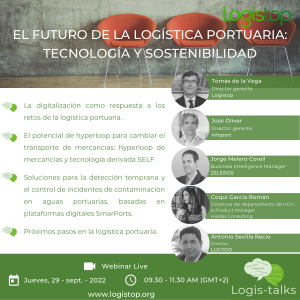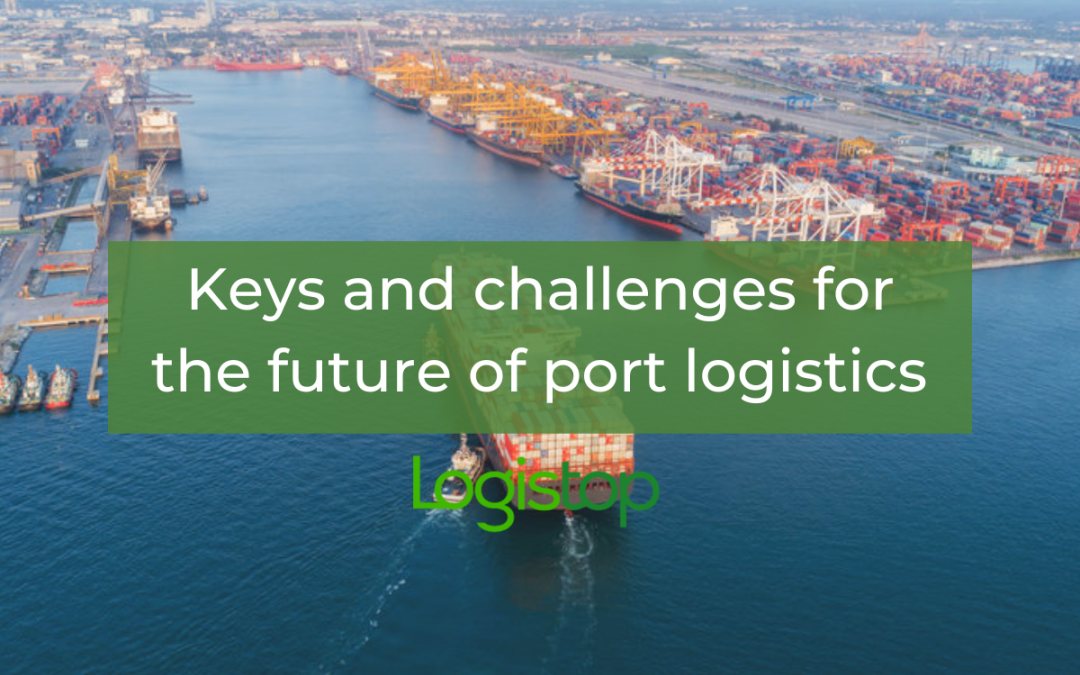- Digital transformation must be integrated into the strategic objectives of companies.
- The potential of hyperloop must overcome existing scepticism, as the advantages it offers outweigh the disadvantages analysed.
- SmartPort digital platforms are key to the integration of port environment data.
- Cross-cutting is key when it comes to approaching innovative strategies.
In Logis-Talks “The future of port logistics: technology and sustainability”, the current and future challenges of port logistics were analysed and debated, as well as the current situation, focusing on two key aspects such as digitalisation and sustainability.
To analyse these issues, we had the participation of José Oliver, Managing Director, Infoport, Jorge Melero Corell, Business Intelligence Manager, ZELEROS, Coqui García Román, Director of the R&D&I Department & Product Manager, Hiades Consulting, Antonio Sevilla Recio, Director, LUCYGO, as well as the presentation and moderation of Tomás de la Vega, Managing Director, Logistop.

Digitalisation as a response to the challenges of port logistics
We are currently experiencing a time of change in the logistics chain, as well as in other sectors, which makes it necessary to rethink and modify processes in order to obtain different results that allow the achievement of the objectives set.
In this sense, José Oliver, from the point of view of innovation and digitalisation, identifies a series of challenges and keys that companies must face in the current scenario.
Among the existing challenges, Oliver highlights three: 1) the fact of having to provide a response to the growth in demand and the complexity of services; 2) rethinking and transforming processes and business models; and 3) the coexistence of innovation and operation.
With regard to these challenges, one of the main barriers to be broken down is the idea that digitalisation is the responsibility of technology departments. Oliver emphasises the need for this transformation to come from the business team and for the technology teams to accompany this transformation.
As for the keys to tackling these necessary transformations, Oliver emphasises three aspects: 1) creating a culture of innovation within companies; 2) appropriate knowledge management, both internally and externally (collaborators, suppliers, etc.); and 3) implementing collaborative models between the agents and actors involved. Therefore, the vision of the smart port, such as the one developed by Infoport, is key to addressing these needs.
“Depending on the decisions that companies make about the digitisation of processes, they will be conditioning their evolution and future development. Therefore, the changes associated with innovation must come from the people who work on the day-to-day running of the business processes in collaboration with the technology departments”
José Oliver, Managing Director, Infoport
The potential of hyperloop to change freight transport
For his part, Jorge Melero, in line with Oliver’s comments, highlights the change that has been experienced in the world’s logistics needs as a result of recent events, which have also highlighted the fragility of the logistics chain.
Melero emphasised that climate change is a factor that must be taken into account as it also interferes with logistics. In this sense, he indicates that transport was responsible for 17% of global emissions in 2019, with freight and aviation accounting for 41%. It is in this context that hyperloop emerges, a mode of transport called to change the transport paradigm with a model of zero direct emissions, with connections between ports and airports and through a relocation of logistics warehouses in lower cost areas.
On the other hand, Melero details how the technology derived from the same has allowed the development of SELF, an autonomous container transport system in port environments focused on the movement between terminals and which will allow the change of paradigm in port transport.
“Hyperloop provides a number of added benefits that will help improve the transport paradigm, including no interaction with the environment, greater energy efficiency and zero direct emissions”
Jorge Melero Corell, Business Intelligence Manager, ZELEROS
SmartPorts digital platforms
For her part, Coqui García Román emphasised the importance of working with data platforms that ensure the sharing of information in real time, mainly among the actors involved in each process. This use of reliable data in real time, as García Román pointed out, makes it possible to reduce the use of paper, as well as radio and email communications, simplifying communication in processes in which different agents in the chain are involved. In this line, he also highlights the need to homogenise the data models used in each process.
García Román highlights the role of the SmartPort digital platforms, which are key to achieving this data integration of the port environment, which will lead to an increase in situational awareness, competitiveness, safety and sustainability.
As examples of success stories, García Román explains the digital solutions iGreenPort and AMURA Ziday created for the early detection and control of pollution incidents in port waters.
“There are many solutions dedicated to efficiency, but very few oriented towards environmental sustainability and this is where we need to put the focus of our next actions”
Coqui García Román, Director of the R&D&I Department & Product Managerr, Hiades Consulting
Next steps in port logistics
Finally, Antonio Sevilla Recio, faced with the panorama that is presented in port logistics with different rhythms and specific circumstances in each port, emphasises the importance of promoting and driving the entire port system with the aim of making the most of the tools available for the creation and development of a collaborative system.
To this end, Sevilla Recio proposes a series of forthcoming aspects to be managed and dealt with which must affect the strategic points of the current port company: carbon footprint, energy, maintenance, control and analysis, as well as a global vision of digitalisation.
The management of these factors, says Sevilla Recio, is essential in order to provide a better service, always bearing in mind the parameters of today’s world.
“Overall, the current picture focuses on the need to move forward in unison, ensuring that ports with lesser future development do not lose pace, facilitating the connection between different ports and working in collaborative situations thanks to the reliable environments in which we find ourselves”
Antonio Sevilla Recio, Director, LUCYGO
About Logistop
Logistop is the benchmark workspace for collective innovation through the realisation of projects hand in hand with our members. Transforming the entire supply chain into a more efficient and sustainable one. All this with the aim of articulating and carrying out innovation projects among the members, without excluding the possibility of collaborating with or receiving support from certain organisations outside Logistop.

